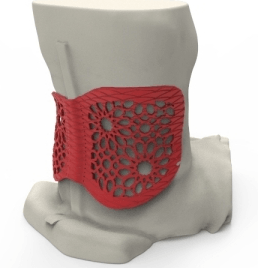Sep 15 2016
Stratasys Ltd., the 3D printing and additive manufacturing solutions company, today announced that Latvian wheelchair fencer, Polina Rožkova, is wearing a customized 3D printed back brace during her quest for gold at the Paralympics 2016 this week. The athlete, ranked 8th in the Épée Women Category A world ranking, turned to 3D printing in order to overcome the current limitations of conventional back braces and enable her to increase performance to compete at the highest level.
 Using a 3D scan of Rožkova's lower back, Baltic3D, a Stratasys Latvian reseller, designed and 3D printed a back brace customized specifically to her middle spine, overcoming the discomfort and limited movement found in conventional supports (Photo: Business Wire)
Using a 3D scan of Rožkova's lower back, Baltic3D, a Stratasys Latvian reseller, designed and 3D printed a back brace customized specifically to her middle spine, overcoming the discomfort and limited movement found in conventional supports (Photo: Business Wire)
Having tested a number of back braces during preparations for the Paralympics, Rožkova struggled with large and cumbersome supports - not only giving her discomfort, but also limiting her movement when fencing. Following consultations with various orthopaedic specialists, Rožkova approached Stratasys' Latvian reseller, Baltic3D, to explore whether 3D printing could offer a solution to her problem. Using a 3D scan of her lower back, the team used a new specialist WiDE software to digitally design a custom-fitted back brace specifically focused on supporting the exact geometry of her middle spine, an area often strained when fencing in traditional back braces due to high impact jerking movements and sweating. With this in mind, the team adopted Stratasys' Nylon 12 3D printing material to 3D print Rožkova a flexible, lightweight back brace, which has been integral to enhancing performance in preparation for her first Paralympic duel.
Jānis Jātnieks of Baltic3D, leader of the 3D printed back brace project, explains: "The conventional back brace Polina was using when she came to us was huge and did not fit her shape at all, causing her discomfort and bruises in everyday life. It was limiting her movement in fencing and hindering her performance, which is not great when you're preparing for the Paralympics. Fortunately, we were able to help! 3D printing gives us the ability to quickly and cost-effectively produce one-off solutions customized to the individual, and having access to Stratasys Nylon material was crucial to giving her the levels of comfort and freedom of movement required to compete with the very best in her field."
The back brace was 3D printed on a Stratasys Fortus 450mc Production 3D Printer in one single build, in just a matter of hours. This enabled Rožkova to test various versions of the back support during training leading up to the event, while behind the scenes Jātnieks and his team were able to quickly iterate the design to perfectly meet her requirements. Having trained with the final 3D printed back brace this week, Rožkova is delighted with the outcome and confident of making her mark in Rio.
"Throughout my years as a professional wheelchair fencer, I have been looking for an alternative, and most importantly, sports-appropriate lower back brace to allow me to fence and move freely without any restraints or pain," says Rožkova. "As the sport puts a lot of strain on the back, I also needed a support that could be replaced easily if it broke during training or competition. I'm ecstatic with the result - not only is the 3D printed back brace visually appealing, but it gives me a level of freedom unparalleled to anything I have ever used before. I feel better equipped than ever to achieve my goals."
"Polina's story is one that embodies all the great things about 3D printing and its ability to truly shape lives," says Andy Middleton, President Stratasys EMEA. "Being able to quickly 3D print low-cost solutions customized specifically to the person takes us away from a world where we settle for small, medium or large, giving consumers more options than ever before. We are extremely proud to be a part of this project and help Polina overcome a design challenge, allowing her to compete at the top. We wish her all the success in Rio this week."